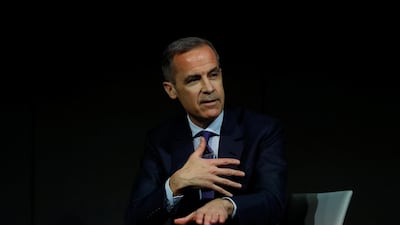Mark Carney is calling for greater regulation to bring the era of cryptocurrency “anarchy” to an end.
The Bank of England governor said Friday the “time has come to hold the crypto-asset ecosystem to the same standards as the rest of the financial system.”
Carney, who is also head of the Financial Stability Board, joins a growing chorus calling for greater oversight of the technology after the explosion of new cryptocurrencies created more than $438bn in paper wealth since March 2, 2017, according to research site CryptoMarketCap.com. His comments also follow a rollercoaster ride for Bitcoin, which lost half its value at the start of the year after surging to a record near $20,000 in December.
Carney noted that “extreme volatility,” and said it reflected a lack of any intrinsic value or external backing. He calculated that the average volatility of the top 10 virtual coins by market capitalisation was more than 25 times that of the US equities market in 2017.
In his speech, he lauded the potential value of the underlying technology of Bitcoin but said the digital currencies themselves have failed as a form of money and rejected the prospect of a central bank digital currency in the near future.
“A better path would be to regulate elements of the crypto-asset ecosystem to combat illicit activities, promote market integrity, and protect the safety and soundness of the financial system,” he said. “Being part of the financial system brings enormous privileges, but with them great responsibilities.”
Carney endorsed the push by the US Securities and Exchange Commission to classify cryptocurrencies as securities subject to laws governing how they are issued and traded. The SEC, concerned that so-called initial coin offerings are fraught with fraud, has taken a hard line on cryptocurrency providers. In recent weeks, the agency sent subpoenas to dozens of ICOs for information related to their businesses.
______
Read more:
Crypto newbies are changing the investment landscape for digital coins
‘Forget bitcoin, invest in bitcoin infrastructure,’ savvy investors say
Don't bank on cryptocurrencies as the hot tip for the year
_______
Holding crypto-asset exchanges to the same standards as those that trade securities would, Carney said, address a “major underlap” in the regulatory approach.
If central banks issued their own digital currencies, Carney said they risked creating a much greater role for themselves, “disintermediating commercial banks in normal times and running the risk of destabilising flights to quality in times of stress.” Even so, he reiterated that the BOE remains open-minded about the possibility in future.
“For many reasons the crypto-assets in your digital wallets are unlikely to be the future of money,” Carney said. “But that is not meant to dismiss them. Their core technology is already having an impact. Bringing crypto-assets into the regulatory tent could potentially catalyze innovations to serve the public better.”
The BOE’s Financial Policy Committee is currently considering the impact of cryptocurrencies on UK financial stability, although Carney said he personally does not see any material risks. He also said the Financial Stability Board will report to the G-20 in Argentina this month.

